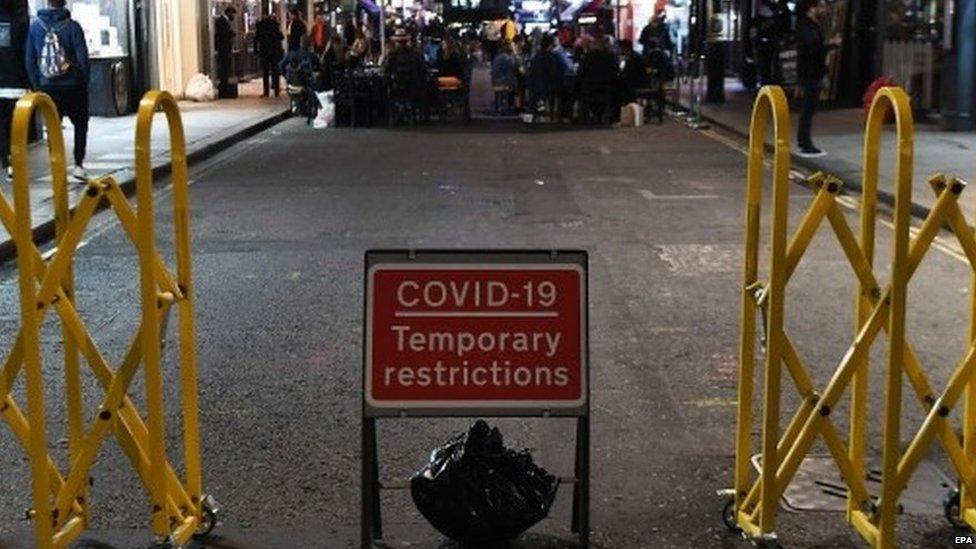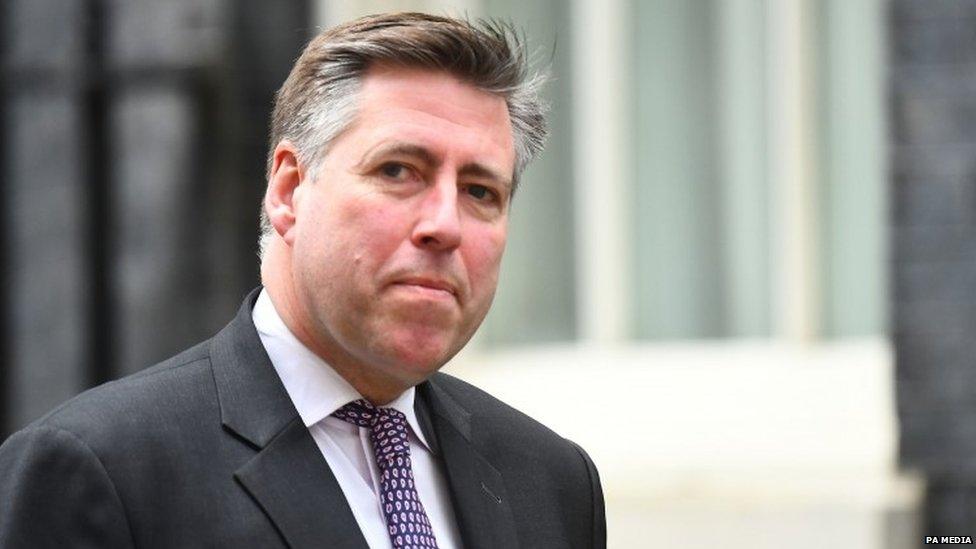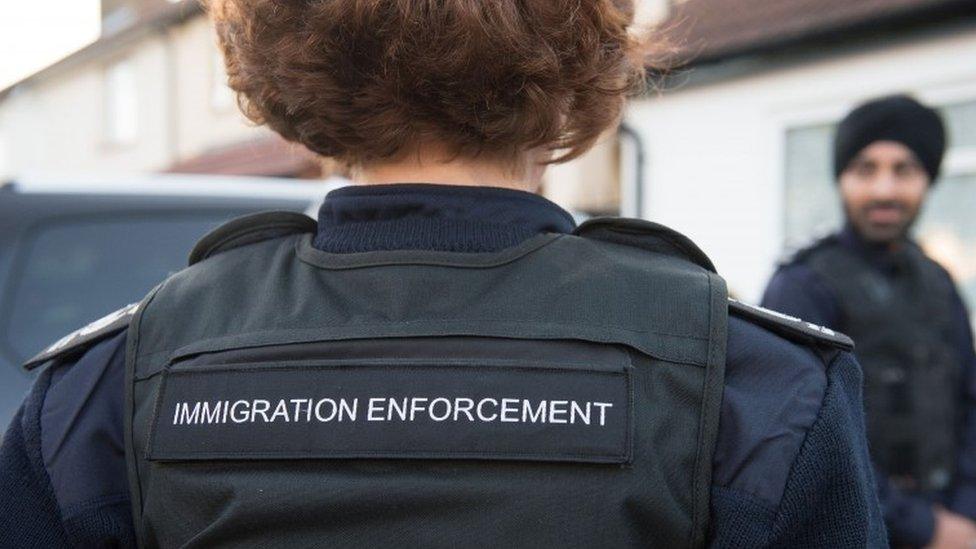The week ahead in Parliament
- Published

This is a week where the twin big issues of the day, the pandemic and Brexit, hit the intricacies of parliamentary process.
MPs have to vote on the renewal of emergency powers in the Coronavirus Act while there's a dive into the detail of the controversial Brexit measure, the UK Internal Market Bill, in the Commons.
And fresh from having extensively rewritten the Agriculture Bill, peers are preparing to sink their teeth into the Immigration Bill.
First the Coronavirus Act, the emergency legislation fast-tracked into law in March.
Whilst the Act does include powers to detain infectious persons and disperse events and gatherings, some of the biggest civil liberties restrictions so far - face mask wearing, requirements to self-isolate, the rule of six, etc - are actually made under the 1984 Public Health Act, so its renewal (or non-renewal) would not directly affect them.
The Coronavirus Act contains a wide range of powers on matters like re-registering retired medical staff, managing large numbers of dead bodies and postponing local elections, allowing courts to use live links, and even loosening legal requirements on the General Synod of the Church of England.
Were its renewal to be blocked those powers would be unwound in an orderly manner over the subsequent days but that looks pretty improbable.
While there may be concerns about the handling of the pandemic, no-one is keen to deploy the nuclear option of blocking renewal, quite yet.
But there will be plenty of concerns aired, assurance demanded and changes suggested.
Their Lordships seem determined to carry on savaging government legislation. The Fisheries Bill, the Agriculture Bill and many more have already been amended.
With the Immigration Bill and, a little later, the Trade Bill before the House and with the UK Internal Market Bill also heading their way - although there's talk it might be postponed while talks with the EU are under way - there will have to be a great deal of parliamentary ping-pong in the coming weeks, with bills bouncing between the Lords and Commons, as agreement is sought.
The recent Agriculture Bill defeats, by margins of 107, 49, 95, 48, 62 and 50 votes, demonstrate that the government is still a long way from being able to enforce its will on the red benches.
Meanwhile, rather in the parliamentary background, all kinds of orders and regulations (Statutory Instruments in Westminster jargon) concerning the pandemic and Brexit are being processed - some of them rather important.
At the moment the SIs have been getting about 20 minutes discussion apiece, most of which is taken up by a minister reading out a carefully-prepared script from which they are not supposed to deviate, because the words they utter could be used in court to help interpret the regulations under discussion.
The ones which will underpin the proposed Kent Lorry Permit, announced earlier this week by Michael Cove, will doubtless be particularly contentious
Here's my rundown of the week ahead:
Monday 28 September
The Commons week opens (14:30 BST) with an hour of Home Office Questions, doubtless to be followed by the normal quota of ministerial statements or Urgent Questions following up stories in the Sunday papers.
And that's followed by a general debate on Covid-19, a kind of extended appetiser to the motion to continue the emergency powers introduced in March, which will be taken on Wednesday.
On the committee corridor, a Delegated Legislation Committee will consider the local lockdown regulations imposed on Blackburn, Darwen, Bradford and Leicester among other places.
And the Joint Committee on Human Rights (14:30) takes evidence on the Overseas Operations (Service Personnel and Veterans) Bill, which aims to protect military veterans from vexatious prosecutions.
Critics say it could allow major human rights violations, including torture and murder, to go unpunished and the Committee will focus on the detail of its provisions, the implications of the presumption against prosecution after five years: the justifications for a presumption against prosecution for service personnel and veterans, and the risk of contravening the UK's international legal obligations and implications for the reputation of the UK Armed Forces and the risk of cases against service personnel being brought before the International Criminal Court.
The witnesses include the Reverend Nicholas Mercer, former Command Legal Advisor, UK 1st Armoured Division, during the Iraq War.
Some of what is said here may well feed back into later debates on the Bill - watch out for Report Stage Amendments in the name of Committee Chair Harriet Harman, and her colleagues.
Elsewhere, Public Accounts (14:30) returns to a saga that it has examined repeatedly over the last decade - the Carrier Strike programme, which has been dogged by delays and cost over-runs. MPs will question senior officials from the Ministry of Defence.
In the Lords (13:00) proceedings open with the introduction of two more new peers, Baroness Fullbrook of Dogmersfield - the former Conservative MP for South Ribble, Lorraine Fullbrook - and Lord Sarfraz, who was Treasurer of the Conservative Party during the 2019 general election. At 38, he will become the third youngest peer in the Lords.
Questions to ministers range across helping with medical and funeral expenses of those who have had Covid-19, helping regional theatres survive the pandemic, reforming the asylum system and the publication of the next energy White Paper - that last is from Lord Howell of Guildford, Margaret Thatcher's energy secretary, back in the 1980s.
The main debate is on a "take note" motion on renewing the temporary provisions of the Coronavirus Act.
While MPs have to vote, every six months, to keep the Act in force, there is no role for the House Lords in the decision. Nevertheless it was thought appropriate for peers to have a debate to air their views and, as I write, there are 52 names on the speakers' list for this debate.
Tuesday 29 September
MPs begin their day (11:30 BST) with Business, Energy and Industrial Strategy Questions.
The day's Ten Minute Rule Bill is proposed by the SNP's Tommy Sheppard, who wants problem drug use to be declared a public health emergency.
His Bill calls for limited decriminalisation of possession of drugs for personal use and for safe drug consumption facilities to be provided, as well as a variety of other measures.
Then MPs will move on to the Remaining Stages of consideration of the United Kingdom Internal Market Bill. Two days had originally been scheduled, but that has now been cut to a single day.
As well as the usual opposition amendments targeting key sections of the Bill, there are some significant government amendments - including one which softens the ban on legal challenges to government actions under the Bill, so that judicial review would now be permitted. This was one of the key points on which super-lawyers in the Lords had objected to the Bill, so it will be interesting to see if they believe this is enough.
Labour has put down new clauses to replace the controversial Northern Ireland clauses with a commitment to adhere to specific clauses in the Withdrawal Agreement, and to create common rules for the internal market which would be subject to regular review.
There's a rather rare creature, a joint DUP and Labour clause to require an assessment every year of the impact on businesses and consumers from the Northern Ireland Protocol. It would cover impact of any regulatory trade policy divergence.
And the Conservative MP Sir Edward Leigh has a new clause which would allow the government to put down a "unilateral interpretative declaration" about the trade rules for Northern Ireland, for approval by the Commons, in the event of the EU not acting in accordance with international law in the implementation of the Protocol.
The adjournment debate, led by the former Business Secretary Greg Clark, is on flexible rail ticketing.
On the committee corridor, there are more pandemic measures under scrutiny - this time the Health Protection Regulations 2020 are before a Delegated Legislation Committee for ninety minutes of consideration.
Public Administration and Constitutional Affairs looks at the work of the Cabinet Office (09:30) and Health and Social Care (09:30) has a session on the safety of maternity services.
In the Lords (12:00) there are two more new arrivals - the Conservative former Chief Whip Lord McLoughlin and Baroness Hayman of Ullock, who, as Sue Hayman, was Shadow Environment Secretary under Jeremy Corbyn.
Question time ranges across protecting victims of child trafficking during the pandemic, funding the Female Offender Strategy and the political situation in Hong Kong.
After that, peers rattle through a series of orders and regulations - first the Air QualityRegulations 2020, then the Carriage of Dangerous Goods and Use of Transportable Pressure Equipment Regulations 2020 and finally a motion to take note of the Electric Scooter Trials and Traffic Signs Regulations and General Directions 2020.
Wednesday 30 September
A busy Commons day, full of interest for procedure nerds, opens at 11:30 BST with half an hour of Northern Ireland questions, followed, at Noon by Prime Minister's Question Time.
Former Shadow Chancellor John McDonnell proposes the day's Ten Minute Rule Bill, to create an accreditation scheme for businesses which meet standards on paying taxes, workers' rights and environmental performance.
Then MPs give what will probably be a rather perfunctory Second Reading to the Non-Domestic Rating Bill.
This is a pandemic measure to postpone the next revaluation for non-domestic rates in England and Wales by one year, to 1 April 2023, based on rents at a valuation date of 1 April 2021. Before the pandemic, the government had been planning to bring the revaluation forward to 2021.

It is not clear whether the Speaker will accept Sir Graham Brady's amendment
Next comes the motion to renew the temporary powers granted in the Coronavirus Act 2020 - which will be a short 90-minute debate because it is a proceeding under an Act under Standing Order No 16.
The exact wording is important here: the motion, specified in the Act, is that the temporary powers it grants "should not yet expire".
So this is framed as a straight Yes or No question, which should not be capable of amendment.
There is an amendment proposed by Tory grandee Sir Graham Brady, which calls for the powers to be renewed at a more frequent interval than the current six months. The initial steer is that it is unlikely the Speaker would select such an amendment, because the priority would be to get a "clean answer" to the question posed, although Sir Graham's effort is carefully drafted to avoid casting doubt on the outcome of the vote.
Another point is that Speakers always look at "breadth" of support for an amendment, by which they mean not just the raw numbers, but the level of cross-party appeal.
The presence of Labour's Harriet Harman, Chair of the Human Rights Committee, and Labour ex-whip John Spellar on the list of supporters, alongside several select committee chairs, may supply that extra zip.
Whichever way that decision goes, the debate looks certain to see some venting by increasingly uncomfortable Conservative MPs - and ministers may have to offer some assurances to meet their concerns.
Then the Sentencing Bill will zip through all its Commons stages of consideration, without touching the sides.
This is a massive piece of legislation - the biggest of this Parliament - with 420 clauses, printed in two volumes. It is a major tidying-up exercise to sort out the contradictory mass of law around sentencing.
In 2012, an analysis of 262 randomly selected cases in the Court of Appeal Criminal Division found that 36% had received unlawful sentences, because of the complexity of existing legislation. And because it is a "consolidation bill" prepared by the Law Commission, it goes through Parliament via a special streamlined process.
Finally, MPs move on to a Labour motion against a series of Statutory Instruments on planning, which have the effect of giving the owners of blocks of flats the ability to extend without seeking full planning permission.
This was first spotted by the Conservative Peter Bottomley, who put down an Early Day Motion against the SIs - and the issue has now been picked up by Labour, who argue that, post-Grenfell, it raises serious safety concerns.
On the committee corridor, Women and Equalities (14:40) hold a one-off session on the impact of coronavirus on children.
In the Lords (12:00), Question Time covers compensation for cancelled holidays and safety testing standards for lightweight polyethylene chest plates
The main legislative action is the first day of report stage consideration on the Immigration and Social Security Co-ordination Bill - where peers are cranking up for another substantial rewrite.

Peers are seeking to make substantial changes to the Immigration Bill
Labour's Lord Dubs, who famously campaigned to get child migrants admitted to the UK, is proposing two cross-party amendments on safe family reunion routes for child refugees and helping children in care, who are losing their free movement rights to become legally resident.
Another big vote will be on ending indefinite immigration detention - limiting detention to 28 days. This comes from the Lib Dem, Lady Hamwee, but is signed by Labour front-bencher Lord Kennedy.
Alongside that, the former Chief Inspector of Prisons, Lord Ramsbotham, has an amendment to ban the use of segregation—being detained apart from other immigration detainees, except in specified exceptional circumstances.
And Lady Hamwee also has an amendment on the rights of UK citizens who have moved to the EU, to return home with their family over coming years.
Labour's Lord Rosser has an amendment on the future of social care which he hopes will attract cross-party support. It requires an independent report on the impact of the new immigration system on the social care workers, and long-term consequences for recruitment, training and pay for our key workers.
Lib Dem Lord Oates wants those with settled status given physical proof, perhaps in the form of a biometric ID card
The crossbencher Lord Green of Deddington, the former British diplomat who was the founding chairman of Migration Watch UK, has an amendment to cap the number of people admitted to the UK to work each year.
And the Conservative Lord Flight, has amendments to ensure that the powers in the Bill can only be used in ways consistent with the UK's obligations under the EU Withdrawal Agreement. I'm not sure how many of these will be dealt with on day one.
Thursday 1 October
MPs begin (09:30) with questions to the Chancellor of the Duchy of Lancaster and Minister for the Cabinet Office Michael Gove.
That is followed by the weekly statement on forthcoming Commons business from the Leader of the House Jacob Rees-Mogg.
And then MPs move on to the annual Social Security Benefits Uprating Bill - a slightly more complicated exercise when the normal "triple lock" indicators on which the uprating is based, like average wages and inflation, have been somewhat scrambled by the pandemic.
On the committee corridor, Welsh Affairs takes evidence on Brexit and trade: implications for Wales, with witnesses from Cardiff Airport, Associated British Ports, Stena Line and the British Ports Association (09:30)
Public Accounts (10:00) looks at the asylum accommodation and support transformation programme with top officials from the Home Office
In the Lords (12:00) questions cover the use of Do Not Resuscitate notices in hospitals and nursing homes since March, and the new sentencing tariff for those who intend to commission a crime and kill a member of the emergency services.
Then, peers turn to the Third Reading of the Agriculture Bill - normally a brief rubber-stamping exercise - before they embark on the Second Reading of the Fire Safety Bill, the post-Grenfell measure to spell out the responsibility for fire safety in multi-occupation dwellings.
Neither House is due to sit on Friday 2 October.
